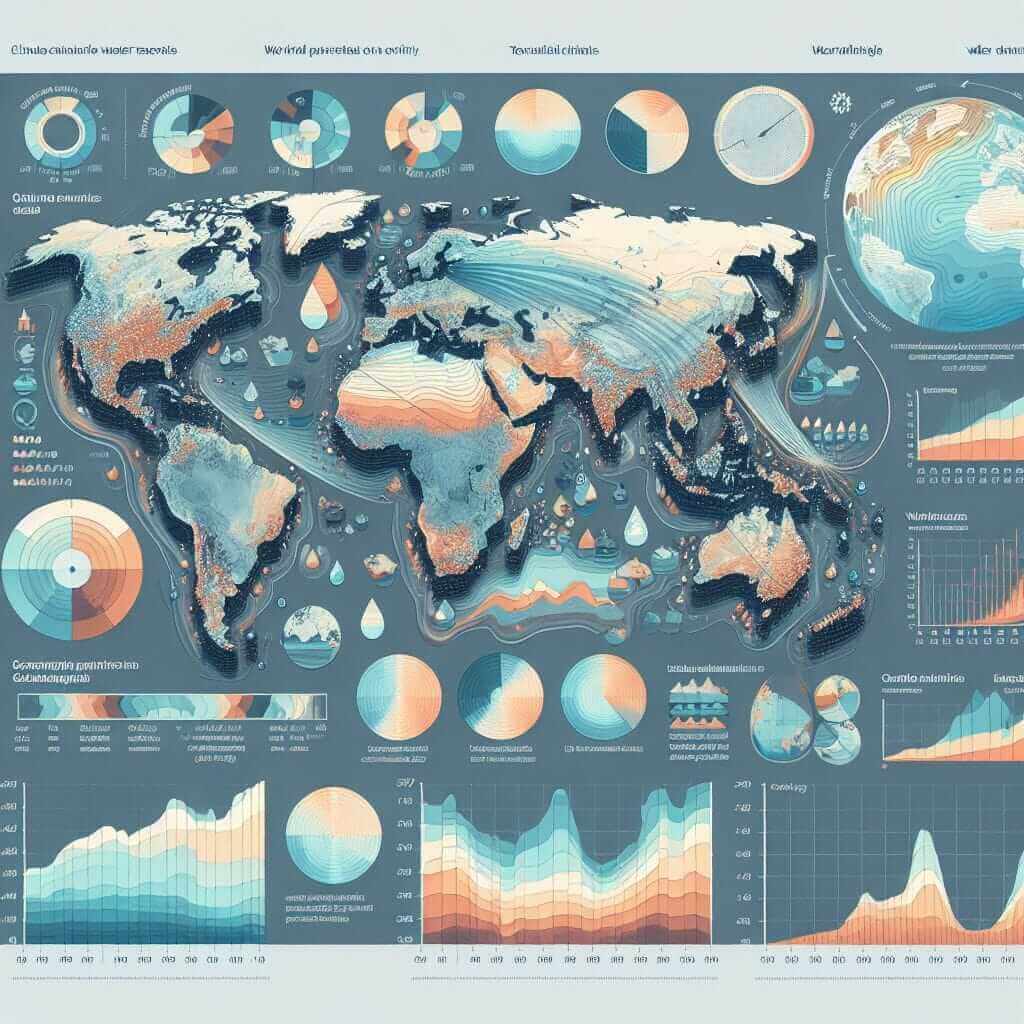The IELTS Reading section is a critical part of the exam, and understanding how to tackle complex texts can significantly boost your score. Over the years, the topic of climate change and its impacts on global water resources has frequently appeared in the IELTS test. Given its relevance and urgency, it is likely to feature prominently in future exams as well. This article aims to provide you with a comprehensive reading sample on “How does climate change impact the distribution of global water resources?”, along with practice questions, answers, and essential vocabulary and grammar insights to help you excel.
Nội dung bài viết
- Reading Passage: The Impact of Climate Change on Global Water Resources (Medium Text)
- Changes in Precipitation Patterns
- Melting Ice Caps and Glaciers
- Rising Sea Levels
- Impact on Water Quality
- Practice Questions
- Multiple Choice
- True/False/Not Given
- Sentence Completion
- Answer Keys
- Common Errors and Tips for Improvement
- Vocabulary
- Grammar Focus
- Complex Sentences
- Conclusion and Recommendations
Reading Passage: The Impact of Climate Change on Global Water Resources (Medium Text)
Climate change has become a significant global issue, impacting various environmental systems, including water resources. The rising temperatures, fluctuating precipitation patterns, and increasing frequency of extreme weather events are all factors that influence the availability and distribution of freshwater resources around the world.
Changes in Precipitation Patterns
Alterations in rainfall periods and intensity are one of the most immediate impacts of climate change. Some regions are experiencing prolonged droughts, while others face unprecedented flooding. For instance, southern Africa and southeastern Australia have seen reductions in annual rainfall, leading to severe water scarcities. Conversely, North America and parts of Europe are contending with increased torrential downpours, exacerbating flood risks.
Melting Ice Caps and Glaciers
The melting of polar ice caps and glaciers is another major consequence of rising global temperatures. Glaciers in the Himalayas, Andes, and Rockies are retreating at alarming rates. The meltwater from these glaciers contributes significantly to river systems that millions of people depend on for drinking, agriculture, and industry. However, as the glaciers diminish, so does the predictability and availability of water from these sources.
Rising Sea Levels
Rising sea levels pose another threat to freshwater resources. As sea levels rise, seawater intrusion into groundwater supplies becomes a critical issue, especially for coastal communities. Countries like Bangladesh and small island nations in the Pacific are particularly vulnerable to this encroachment, threatening the supply of potable water and agricultural viability.
Impact on Water Quality
Climate change also affects water quality. Warmer temperatures can lead to the proliferation of harmful algal blooms in freshwater bodies, making water unsafe for consumption. Increased runoff from heavy rains can carry pollutants into rivers and lakes, further degrading water quality and posing risks to human health and ecosystems.
Practice Questions
Multiple Choice
-
Which region is experiencing reduced annual rainfall leading to severe water scarcities?
- A. North America
- B. Southern Africa
- C. Europe
- D. The Pacific Islands
-
What is a significant consequence of rising global temperatures on glaciers?
- A. Increased river flow
- B. More predictable water sources
- C. Retreating glaciers
- D. Melting of polar caps
True/False/Not Given
- Climate change has caused water resources to become more evenly distributed across the globe.
- Rising sea levels primarily affect inland water bodies.
- Increased temperatures can lead to harmful algal blooms in fresher water bodies.
Sentence Completion
- As polar ice caps and glaciers melt, ____.
- Changes in precipitation patterns can lead to either prolonged droughts or ____.
Answer Keys
- B. Southern Africa
- C. Retreating glaciers
- False – Climate change causes uneven distribution of water resources.
- False – Rising sea levels primarily affect coastal groundwater supplies.
- True – Increased temperatures can lead to harmful algal blooms in freshwater bodies.
- As polar ice caps and glaciers melt, the availability of meltwater contributing to river systems decreases.
- Changes in precipitation patterns can lead to either prolonged droughts or unprecedented flooding.
Common Errors and Tips for Improvement
- Misreading Questions: Always read the questions carefully to understand what is being asked.
- Guessing Without Evidence: Do not guess answers without finding the supporting text in the passage.
- Time Management: Practice managing your time effectively to ensure you can answer all questions within the given timeframe.
Vocabulary
- Scarcities (noun) /ˈskɛrsɪtiːz/: Shortage or deficit.
- Torrential (adjective) /tɔːˈrɛnʃəl/: Relating to an overwhelming or violent outpouring, especially of rain.
- Proliferation (noun) /prəˌlɪfəˈreɪʃən/: Rapid increase in the number or amount of something.
Grammar Focus
Complex Sentences
- Structure: Main clause + subordinating conjunction + dependent clause.
- Example: “As glaciers retreat, the availability of meltwater decreases.”
- Practice: Create sentences combining the effects of climate change and water resources using complex sentence structures.
Conclusion and Recommendations
To excel in the IELTS Reading section, especially on topics like climate change, you must develop skills in skimming, scanning, and understanding complex texts. Consistent practice with diverse reading materials, managing your time effectively, and expanding your vocabulary will greatly improve your performance. Continue to use reputable resources and practice regularly.

For further reading, you could explore related articles like The Impacts of Climate Change on Water Resources and How Does Climate Change Affect Freshwater Resources. These will provide additional insights to deepen your understanding and prepare you for the IELTS exam.